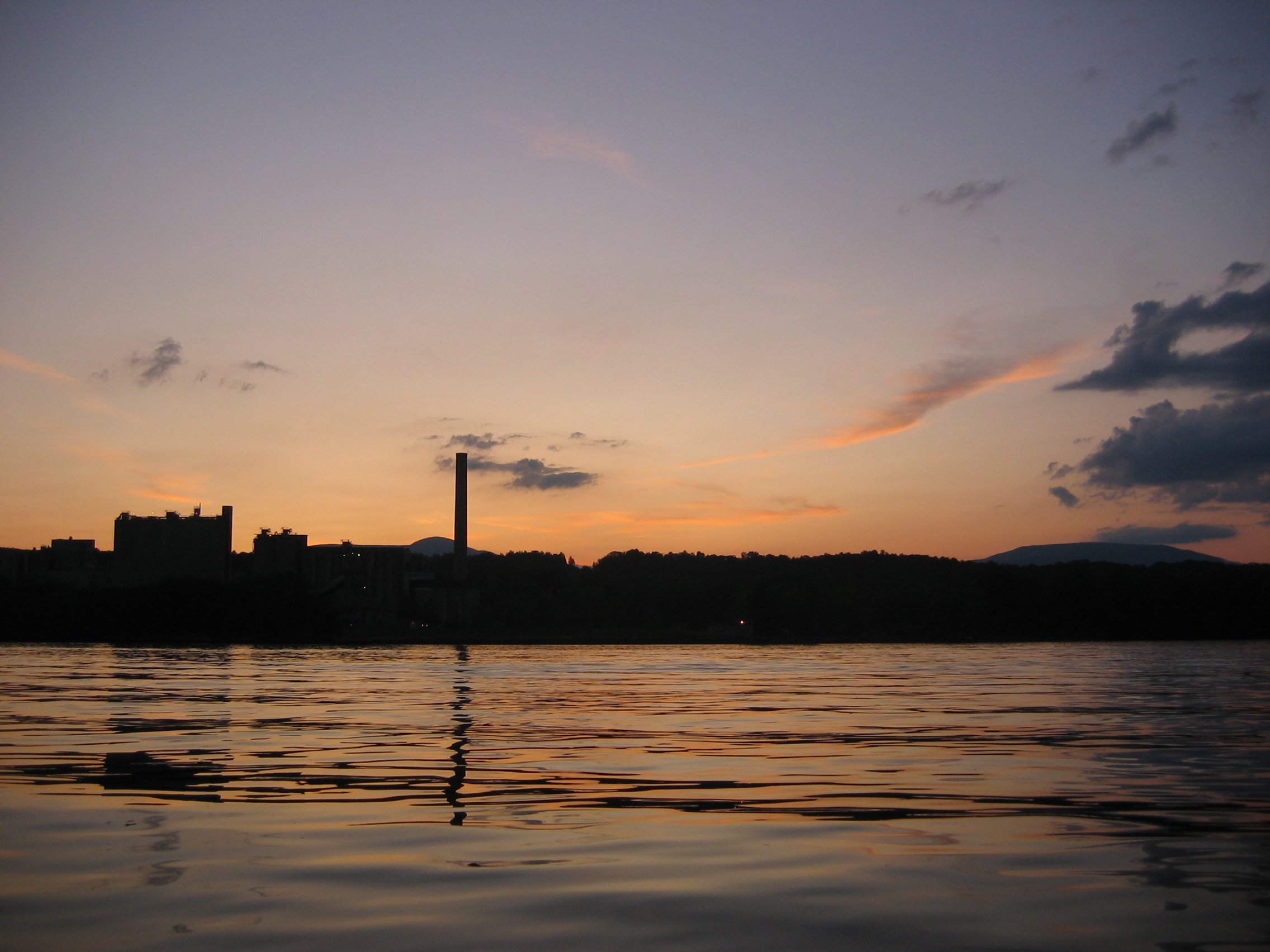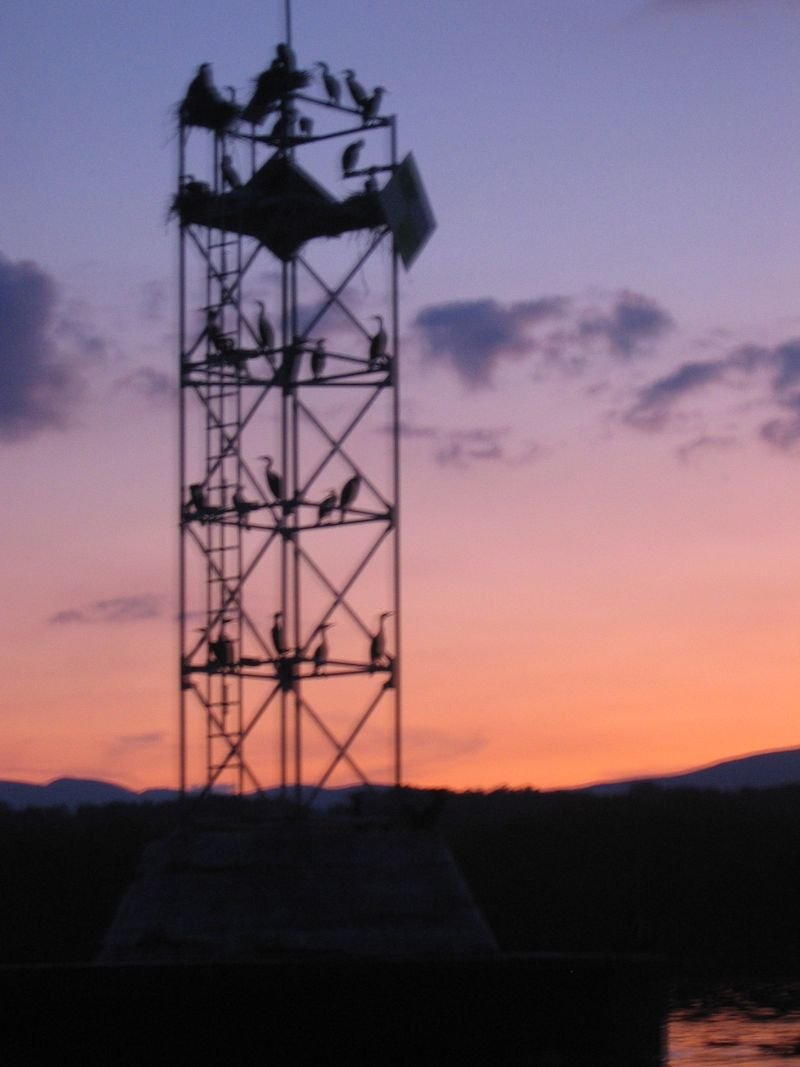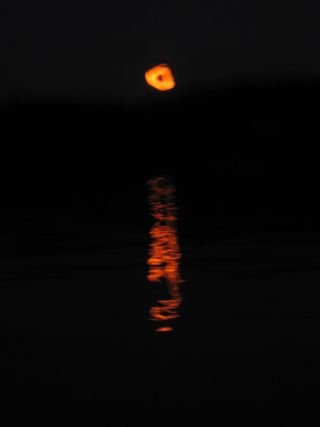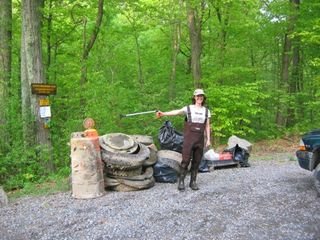Blind(s)

Late fall paddles have a certain thrill to them. The air warms for a day, but the water has already begun its pull to cold. Sitting so close to the water, my feet begin to numb from the cold of wet feet while I’m in a t-shirt, basking in the sun. I think of it as two worlds: the world of light and the world of dark, the world of warmth and the world of cold. In other words, paddling is a lot like life.
On Sunday I ran into two men who swim with the Bard master’s swim team I join from time to time. They were heading south so off we went together. We debated popping into the North Tivoli Bay to disrupt the happy gunshots of duck hunters.
When I first began to paddle I had no idea that hunters took over the Bays for a period every fall. I wandered in and delighted by the sight of a duck bobbing at the edge of a clearing of cattails, I slowly approached. It was beautiful, that noble teal head, a white ring like a necklace, a brown chest. I got closer scootching along with the current, delighted that the bird was allowing me to admire it. And then I realized the obvious. I swiveled in my seat. Behind me stood a hunter on a ramshackle duck blind, gun slung to the side, shaking his head.
I could have paddled away and left this embarrassing moment in the Bay, a secret held by the unknown hunter, his beautiful decoy and me. But in fact, I tell this story a lot—there is nothing like telling stories that make me look like an idiot. But there is something else to the story. I am gullible, in more than decoys. Though I know people hunt, part of me still doesn’t understand that people with guns want to shoot and kill other creatures. By understand I mean that because this makes no sense to me I choose to live as if people who hunt to kill do not exist.
We stayed on the main river that day, finally dipping into the South Tivoli Bay, wide and open after a season clogged with the beautiful, invasive water chestnut. On the return we bobbed off of Magdalen watching an eagle shred its dinner. The warm air had created low-lying clouds that formed a skirt around the Catskills on the far shore. I felt warm and strong and happy. I ignored that my feet were cold. I also ignored the sounds of guns exploding on both the west and eastern shores. I had journeyed onto the river to marvel, feel free, explore and have fun. And I didn’t want to alter that, even given those shots that told me I am perhaps naïve in how I see this world. This is my own blind.
Late fall paddles have a certain thrill to them. The air
warms for a day, but the water has already begun its pull to cold. Sitting so
close to the water, my feet begin to numb from the cold of wet feet while I’m
in a t-shirt, basking in the sun. I think of it as two worlds: the
world of light and the world of dark, the world of warmth and the world of
cold. In other words, paddling is a lot like life.
On Sunday I ran into two men who swim with the Bard master’s
swim team I join from time to time. They were heading south so off we went
together. We debated popping into the North Tivoli Bay to disrupt the happy
gunshots of duck hunters.
When I first began to paddle I had no idea that
hunters took over the Bays for a period every fall. I wandered in and delighted
by the sight of a duck bobbing at the edge of a clearing of cattails, I slowly
approached. It was beautiful, that noble teal head, a white ring like a
necklace, a brown chest. I got closer scootching along with the current,
delighted that the bird was allowing me to admire it. And then I realized the
obvious. I swiveled in my seat. Behind me stood a hunter on a ramshackle duck
blind, gun slung to the side, shaking his head.
I could have paddled away and left this embarrassing moment
in the Bay, a secret held by the unknown hunter, his beautiful decoy and me.
But in fact, I tell this story a lot—there is nothing like telling stories that
make me look like an idiot. But there is something else to the story. I am
gullible, in more than decoys. Though I know people hunt, part of me still
doesn’t understand that people with guns want to shoot and kill other
creatures. By understand I mean that because this makes no sense to me I choose
to live as if people who hunt to kill do not exist.
We stayed on the main river that day, finally dipping into
the South Tivoli Bay, wide and open after a season clogged with the beautiful,
invasive water chestnut. On the return we bobbed off of Magdalen watching an
eagle shred its dinner. The warm air had created low-lying clouds that formed a
skirt around the Catskills on the far shore. I felt warm and strong and happy. I ignored that my feet were cold. I also
ignored the sounds of guns exploding on both the west and eastern shores. I had
journeyed onto the river to marvel, feel free, explore and have fun. And I didn’t
want to alter that, even given those shots that told me I am perhaps naïve in
how I see this world. This is my own blind.
Full Moon Paddle

Not much blogging this summer, but some adventuring (which I’ll perhaps get to recounting at some point). Last night was the September full moon—not as special as the August full moon, which is the Sturgeon Moon, but it is the Corn Moon and the corn has been pretty wonderful here. I put in at Cheviot, which is just a bit north of Tivoli. It’s almost across the river from the St. Lawrence cement plant, which looms on the western shore. When it’s dark I confess that the plant is magical with its lights.
I put in around 7:15 and pointed north. It’s a great section to paddle because the river spreads wide and shallow so the channel snakes up very near the western shore (where barges dock to load and unload at the cement plants). So I could paddle down the middle of the river and except for the occasional sea monster it’s pretty safe.
Not much blogging this summer, but some adventuring (which I’ll
perhaps get to recounting at some point). Last night was the September full
moon—not as special as the August full moon, which is the Sturgeon Moon, but it
is the Corn Moon and the corn has been pretty wonderful here. I put in at
Cheviot, which is just a bit north of Tivoli. It’s almost across the river from
the St. Lawrence cement plant, which looms on the western shore. When it’s dark
I confess that the plant is magical with its lights.
I put in around 7:15 and pointed north. It’s a great section
to paddle because the river spreads wide and shallow so the channel snakes up very
near the western shore (where
barges dock to load and unload at the cement plants). So I could paddle down
the middle of the river and except for the occasional sea monster it’s pretty safe.
Off I went, coasting through spooky calm water. While the
sun did a dizzy descent behind the Catskills, gulls gave off their haunting “you
are at the ocean” call. Soon enough, the moon popped up, huge, white,
frightening, and spread light and shadows across the water.
I arrived at a mid-river marker where Cormorants nest. The dark
birds dotted the spindly metal structure as they went about their end of day rituals. They burp. They
clack their bills. There was the peep of babies hoping to be fed. At the top
one bird stood in regal silhouette in a blue-black sky. The whole place stunk.
For a while I floated there, facing the moon, the birds
behind me snaggling away. Did they appreciate the moon? Perhaps yes. Me, I fell
into that moon. I wish there was a better word than awe. But there I was, awed,
small and huge at once, and grateful for this moment on the river, for this
life on this round earth.
This evening I went out again hoping to capture that magic
once again. It’s a risky thing to do because disappointment is almost
inevitable. But no, the evening played out with the same gorgeous display of
sun shading orange, pink, blue, black to the east, and the moon popping up
orange to the east. If I fed on
bugs I would have returned home full.
Picking up Garbage

“Susie, it’s your duty to keep America beautiful,” Becky said.
And we continued to drift.
My father loved this story, perhaps because he thought Becky had made up this great line. I’m pretty sure Becky had pulled it from a TV ad, though we did not have a TV in our own house. He told the story over and over again, emphasizing how the comment seemed to come out of nowhere and Becky’s seriousness in delivering this mandate. Whether it came from Becky, or from hearing the story so many times, I have taken it seriously. It’s my job to keep garbage from ruining the beauty of the Hudson River and of the Tivoli Bays in particular.
One day, when I was about five and my sister seven, the two of us were floating on an inflatable raft on Long Pond (Cape Cod). Our father sat on the tiny sand beach and watched. It was a lazy, quiet moment of drifting.
“Susie, it’s your duty to keep America beautiful,” Becky said.
And we continued to drift.
My father loved this story, perhaps because he thought Becky had made up this great line. I’m pretty sure Becky had pulled it from a TV ad, though we did not have a TV in our own house. He told the story over and over again, emphasizing how the comment seemed to come out of nowhere and Becky’s seriousness in delivering this mandate. Whether it came from Becky, or from hearing the story so many times, I have taken it seriously. It’s my job to keep garbage from ruining the beauty of the Hudson River and of the Tivoli Bays in particular.
So on May 9 at noon I joined Carol Lewis, Hudson kayaking enthusiast, her friend Nancy, Max Kenner, who is in charge of Bard’s Prison Initiative (BPI), his cousin Zach, who was a former student of mine and a current student, David Soffa. We gathered canoes generously loaned from Hudsonia stashed at the Bard Field Station.
Two canoes headed out into the South Tivoli Bay, which at this time of the year is still free of the water chestnuts that will make it impassible come August. We picked up a few choice items before ducking onto the river to round Cruger Island and back into the North Bay. David rowed like a maniac to keep us on course and moving slower than my usual meditative pace. We stopped several times on Cruger to gather bottles, examine a large object, which is perhaps a part of an automobile, take photos of an unusual dead animal and enjoy the honeysuckle, the red columbine in bloom, and the wide open river.
At the dock, David headed back to campus while I donned my waders and shoved out with the boat one more time to sweep the north end of Tivoli Bay. The North Tivoli Bay is where I usually paddle—it is protected from the river because of the railroad tracks, and inside of the bay there is a rush of animal and bird life. At the same time, the stillness of the Bay is often otherworldly. Saturday it had that special texture of vibrant and calming at once. Looking for garbage in the reeds is like an Easter egg hunt for adults—you start to hope to find something. And there is always great glee in finding something original (that is, beyond a bottle). The odd doll, the tire to a bicycle. Searching is an art. With focus, I came to more easily see texture or the glint of light that alerted me to the presence of something unnatural.
The wind at my back, I coasted along, gathered up a tire, more bottles, and also scared off a few snapping turtles that were catching the sun that hovered behind clouds most of the day. On the return I battled the wind, unable to keep the canoe on course. At many points I ran aground, and at one moment struggled to keep from the shore because I would have collided with a snapping turtle (see photo).
In all, a great day—good people, good garbage.
Back on the River
April 18, 2009. Back on the river. On Friday evening I slid my kayak into the water off of Tivoli and shoved north toward Cheviot. As I put in a man pulled onto the rocky landing in his boat. He tells me he lives in Tivoli and paddles almost every day, though through this ice-choked winter he missed a few days. I paddle almost every day in the warmer months and have never seen this person. Makes me think about how solitary this sport is.
There is some new graffiti in the walls just north of town. Big bulky letters: Tell the Truth. Will do.
April 18, 2009. Back on the river. On Friday evening I slid my kayak into the water off of Tivoli and shoved north toward Cheviot. As I put in a man pulled onto the rocky landing in his boat. He tells me he lives in Tivoli and paddles almost every day, though through this ice-choked winter he missed a few days. I paddle almost every day in the warmer months and have never seen this person. Makes me think about how solitary this sport is.
There is some new graffiti in the walls just north of town. Big bulky letters: Tell the Truth. Will do.
The ride was uneventful except that the wind was against me and the current with me so there was quite a chop.
Then on April 19, I headed south, wanting to loop down to the Kingston-Rhinecliff Bridge but the wind at my back made me think that the return might be unpleasant. Instead I dodged into the North Tivoli Bay to see what I might see. A medium sized snapper sunned on the banks. Another pointed his snout through the water. At the landing I saw eight tires stacked up, dug out of the bay the previous day by my friend Carol Lewis. I decided to add to the stack and hauled out a tire, filled with muck. Negotiating it onto my kayak, I managed to wrench my back (ice pack in place as I write this) so my efforts ended sooner than I wanted. What horrified me were the zebra mussels lacing the tire—they are now everywhere.
Back on the river I noted the dayglo orange porta-potty sunk into the river on the northeast side of Magdalen or Goat Island. Pretty attractive. Then I ran south to Cruger to check on the eagle there and was told by three men with Greenland paddles that they had just seen an Osprey. On my return I saw three mallard ducks in a fantastic mating bundle/fight. They were a frenzy of violence and sex, dunking each other into the water as if they wanted to drown each other. For a moment I felt grateful not to be a duck.









